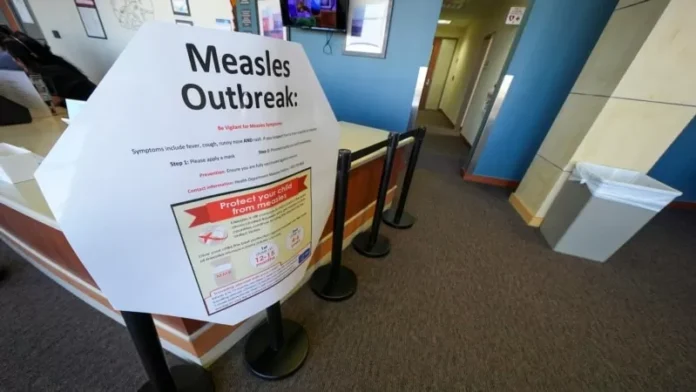Measles outbreaks in West Texas and New Mexico have been making headlines recently, with the number of cases rising to over 250 and two unvaccinated individuals tragically losing their lives due to measles-related causes. This highly contagious virus, which is spread through the air when an infected person breathes, sneezes or coughs, is preventable through vaccines and was declared eliminated from the U.S. in 2000. However, the recent outbreaks serve as a reminder of the importance of vaccination and the potential consequences of not being vaccinated.
According to Texas state health officials, there have been 25 new cases of measles reported since the end of last week, bringing the total number of cases in Texas to 223. Out of these, 29 people have been hospitalized. In neighboring New Mexico, health officials announced three new cases on Tuesday, bringing the state’s total to 33. The outbreak has also spread to Eddy County, with one reported case. In addition, Oklahoma’s state health department reported two probable cases of measles on Tuesday, which have been linked to the outbreaks in West Texas and New Mexico.
The seriousness of these outbreaks is further highlighted by the fact that two people have already lost their lives due to measles-related causes. In Texas, a school-age child passed away last month, while New Mexico reported its first measles-related death in an adult last week. This serves as a stark reminder of the potential consequences of not being vaccinated against this preventable disease.
Measles cases have also been reported in other states such as Alaska, California, Georgia, Kentucky, Maryland, New Jersey, New York, Pennsylvania, and Rhode Island. The U.S. Centers for Disease Control and Prevention (CDC) defines an outbreak as three or more related cases, and there have been three clusters that have qualified as outbreaks in 2025. This highlights the need for continued vigilance and the importance of vaccination in preventing the spread of this highly contagious virus.
In the U.S., most cases and outbreaks are traced back to someone who has caught the disease abroad. However, it can then spread rapidly, especially in communities with low vaccination rates. This is why the best way to protect oneself and others from measles is to get the measles, mumps, and rubella (MMR) vaccine. The first shot is recommended for children between 12 and 15 months old, and the second between 4 and 6 years old. This not only protects the individual but also helps to prevent the spread of the disease to others.
For those who may be at a higher risk of infection, such as family members living with someone who has measles or individuals with underlying medical conditions that make them more vulnerable to respiratory diseases, it is recommended to consider getting a booster shot. This is especially important for those living in areas with ongoing outbreaks. Scott Weaver, from the Global Virus Network, an international coalition, emphasizes the importance of staying up to date with vaccinations in order to protect oneself and others from preventable diseases.
The CDC states that adults with “presumptive evidence of immunity” generally do not need to receive the measles vaccine. This includes those who have written documentation of adequate vaccination earlier in life, lab confirmation of past infection, or those born before 1957 when most people were likely to have been naturally infected. However, for those who are unsure of their vaccination status, a doctor can order a lab test called an MMR titer to check for levels of measles antibodies. It is important to note that insurance coverage for this test may vary.
In cases where there are concerns about waning immunity, the CDC states that getting another MMR shot is harmless. This is a small price to pay for the peace of mind and protection against a potentially serious and preventable disease. It is also important to note that those who received a live measles vaccine in the 1960s do not need to be revaccinated. However, those who were immunized before 1968 with an ineffective measles vaccine made from killed virus should receive at least one dose of the MMR vaccine. This also applies to those who are unsure of which type of vaccine they received.
There is currently no specific treatment for measles, so doctors focus on alleviating symptoms, preventing complications, and keeping patients comfortable. However, the best way to prevent the spread of this highly contagious virus is through vaccination. It not only protects the individual but also helps to protect the community as a whole.
In

